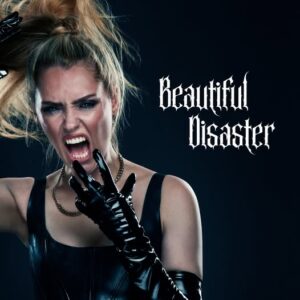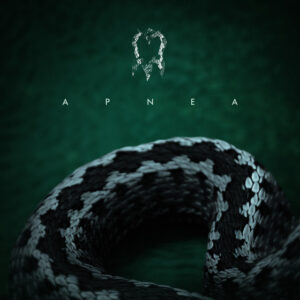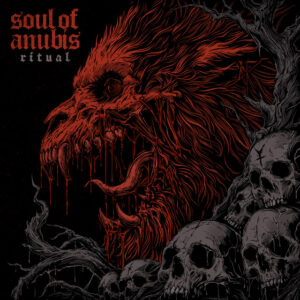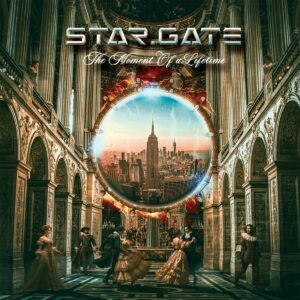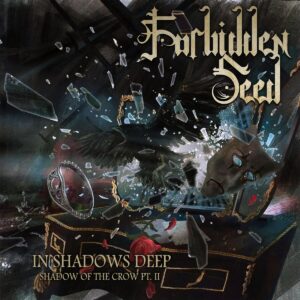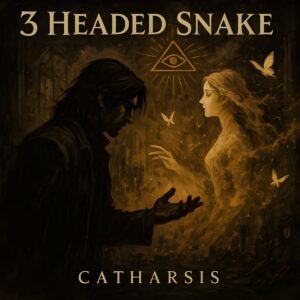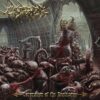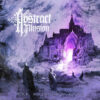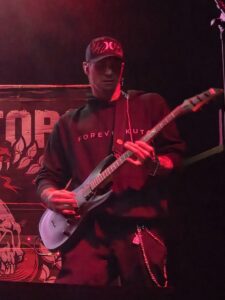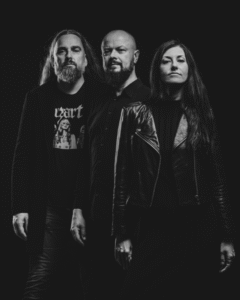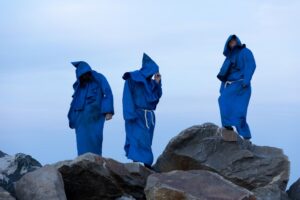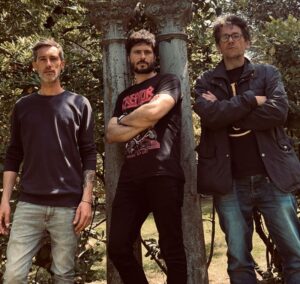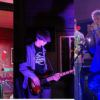Michał Chrościelewski, Paweł Smarkusz, Monika Chrościelewska
CZART
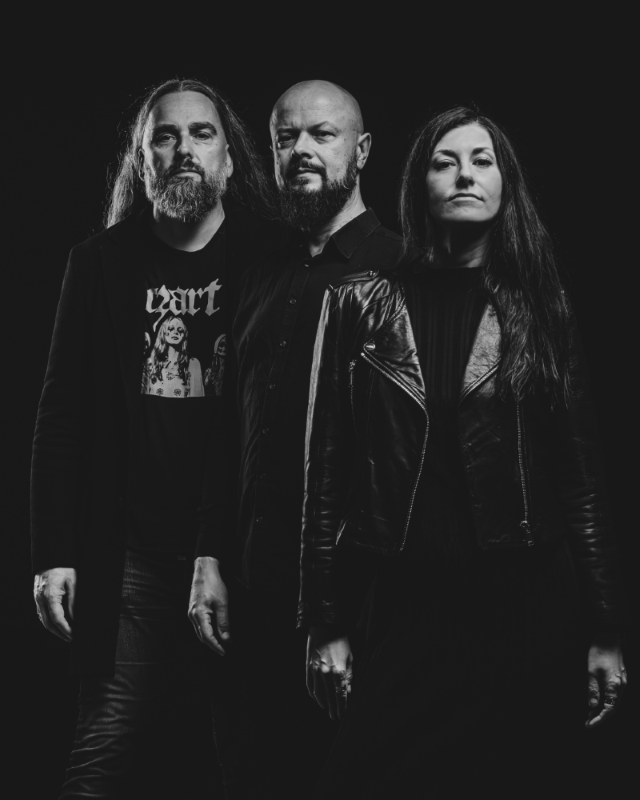
“We didn't have examples; we didn't have any references to follow.” - Monika Chrościelewska, CZART
interview at
Let's start from the top. How did CZART form?
Paweł: It's been a while. Almost 30 years, actually, with Michał nearly 30 years, with Monika about 25 years, all related with music and beyond. I played in a local metal band before, called CRUSADE. Michał was in his band. His band stopped. My band stopped. We came together again and started another one for a few years, then I happened to meet Monika on another project, which was completely not metal related. I would say soft rock, acoustic rock.
Paweł: That's how we met. Then the three of us continued through the years with some gaps in the process. It's been a long journey for us, actually. It didn't start yesterday.
Michał: We started in the mid-90s. When I met Paweł, he had already recorded an album published in Poland by Morbid Noizz. They played technical death metal. And we were really young, just started studying. We thought that maybe after our studies we would just follow our musical roads, pursue our dreams, and play music. We had a band for a few years with Paweł's brother, but that also ended. Then we met Monika. Actually, Paweł and Monika recorded two albums together 2001, 2003.
Monika was studying in Krakow. I sent her some songs, and we decided to play together which was our alternative rock project called SELEDYN. Then we started our personal careers, we started to work, so music for us was always a hobby. We did it only in our free time. So that's why after 25 years of not playing metal music, we decided last year to just try something and experiment. Next year we hope to record our album with our other alternative project, SELEDYN. I hope so, really, because right now we are on a roll.
Paweł: It's in process already. It's just suspended because we have to focus more on CZART right now.
Michał: It's like we have a second chance, especially me and Pavel in metal. We can do things that we want to do, but back then it was harder. Last year when I was making videos with AI for our project, I thought to myself "This tool is so amazing. Some of our metal songs might just work perfectly with this new tool."
And, that's how it started, actually. When I got the book by Julian Tuwim about Polish witchcraft and sorcery, and read the passage about artificial language, for me that was like, "Oh my God, it's a link! It's like we can connect the past with the future and with the present.” Time actually is changing so fast that the tools we used six months ago in March 2025 have evolved into totally new tools, and we can do even more interesting things.
Paweł: It's funny because we were complaining about the tools in March and during the course of production of our debut album and then after the album was finished things had developed so much that we could do it the way we wanted. The tracks were far more supreme and the separation of them. We could overlay the live parts with better quality. It's amazing how fast it develops.
You mentioned the book by Julian Tuwim. How did you happen upon that book?
Michał: Well, actually, I found it online. It's in the public domain. Here in Poland, Julian Tuwim is very popular. He's a very famous Polish writer. But usually, we study other areas of his work and not the texts about devils! It was pretty surprising to us to find that book and the many interesting ideas and stories about Polish demonology. His concept of an artificial language spoken by the devil just blew our minds completely.
That's amazing. It's like finding someone in the UK discovering that Shakespeare wrote about demonology and predicted the future!
Paweł: Yes. Note that most of Tuwim's creations are actually for kids. In fact, many kids’ first contact with literature or poetry in Poland is Tuwim's short poems which are often humorous and about animals and this kind of old school stuff. It's like finding out that Christian Anderson in addition to making all these fairy tales was also making books about demons!
Michał: Although it's in a polite way. It's not as if he was encouraging people to practice the occult. Rather it's like a collection of really old texts.
Okay, so he wasn't like Aleister Crowley or someone like that.
Paweł: No, not at all.
Let's talk about your videos. What's your process for making videos like? I presume the videos are mostly all AI, or do you integrate live footage in there as well? Where do the ideas come from?
Michał Chrościelewski: There are many AI video tools right now on the market. I was checking all of them and actually the main vibe I managed to acquire was to have our music in the headphones all the time while making some graphics videos. I remember at the beginning, when I was able to recreate normal photos or videos. I thought that was really something. It's like the first impression that you always have with AI tools. But later on, I thought, “Why use AI tools to recreate reality when we can use the AI to create something that hasn’t been created before, something that doesn't exist?”
Michał: I tried to create a visual style that was more like paintings or dreams with horror and some folk but that didn't cross the line to gore. I didn't want to show people blood or some creepy images, you know, obscure but appropriate. It was more like exploration, experimentation. I remember some things just clicked, some of the images I created and videos, they just connected to the music. That was how the process looked. I remember that I spent many, many hours in front of my computer.
Monika: Yeah. And making all the decisions, which is an important part of it. The AI that we use in this project doesn't work like a Polaroid machine where you just click the button and get the result. The artist, Michał, had to really make all small decisions about everything, which was amazing. He really puts a lot of work in the compositions and the concept of the videos.
Michał: We tried to incorporate real footage because we wanted to also show that we are a real band. People who know us know that we can play our instruments. For us, using the AI wasn't just like, "I cannot play guitar, so I'm going to type some prompt and make a guitar." No, it was using our own riffs, drum loops, what we had, because we have a vast library of music that we recorded over the years.
We started to experiment with that. We wanted to see what AI could bring. We had to see if it would be like random stuff or maybe it's going to put something together that has already been recorded by other artists. I remember checking Shazam to see if part of my songs were written before by some other artists. Every time I checked, it said “no match.” I was like, "Oh my God, that's good, that's cool, that's really good."
Paweł: It's worth saying as well that people often associate AI with ChatGPT and that you enter a prompt and it does everything for you. But that's a misconception of AI, especially the more advanced tools in graphics, visuals, and music. It doesn't work like that. I mean, there is of course a degree of randomness at some point, but then your good taste prevails to choose what of that randomness you're willing to accept. But everything starts in the head. You need to have a vision when you sit behind the keyboard and start typing. Plus, typing alone!
It took months and hectic hours to develop the little nooks of how to type it properly to get the right juice out of it. But even when you get that creation, you still need to employ another tool to make a motion picture in addition to the usual tools for assembly, editing, and synchronization which also needs to be written for the music. It's a long process really. It doesn't come with one prompt, "Make my CZART video." It doesn't work like that. It starts with a vision, and it's hugely based on the personal taste of the artist to determine what to accept and what to put in.
Michał: I choose the hard way. I wanted to have much more control of my creativity and to use the tools in the way I wanted to use them to fulfill my vision. When I started my adventure with music, I was 16 and I had an Amiga computer. I used Pro Tracker and the programs you need for all the beats, the drum kick, and the snare. Also to record and sample guitar on a magnetic tape. I remember making graphics on Amiga because I worked as a graphic designer for a few years. I remember back then we didn't have any scanners, so I had to animate or create a picture in Deluxe Paint on Amiga pixel by pixel. I would spend hours on that. When I saw what AI could do for me, it was a much smoother process.
But I decided to make the videos from images to videos. First, I spent time creating an image to have my own style. Because you know that you have some AI tools that allow you to put the prompt like from ChatGPT, but you cannot control the visual style. The computer does it for you based on some Hollywood movies or something like that. It's a lot trickier and harder when you do it like you want it to do. The response for us was astounding.
Monika: You can compare the use of AI in music to, for example, architecture. I have a friend who's an architect. When she was studying, she had to draw everything by hand with a pencil. At the same time, in Italy students of architecture were already using computer software. They weren't drawing by hand at all. Everybody uses software in different areas of life, but I think that if you have that primary skill of actually being able to draw nicely, an expert will see that in your work, even if you use software afterwards. I think that anyone who sees your art will see that difference if they also have been trained in some way, whether it's training the ear or training the eye.
Is there an ongoing narrative throughout the 16 tracks? Is there a storyline or a particular theme you're trying to emphasize?
Michał: We wanted to base the lyrics on an archaic Polish language similar to the things that Tuwim wrote. I even used excerpts from his book in four songs. One of them was from 1614, and it was like a spell to attract a man, a spell for women. Back then in Poland when a girl didn't find a man and didn't get married, she had to pull a big wood behind her on a rope through the whole village. Everybody would laugh at her because she had to get some spells to put on some guy to get him to love her. It was a patriarchal society. A woman without a husband was considered useless back then. All the Polish demonology according to Tuwin was like an artificial language. People in Poland at that time didn’t have a lot of knowledge. Everything was based on beliefs and superstitions. One result was that when people committed evil deeds, they would blame devils.
For example, if a guy cheated on his wife, he would say the other girl enchanted him and the devil taught her to do it. It was an excuse; it was the devil's fault. People didn't understand the laws of nature and science. Also, after Christianity came, only people who knew how to read could get access to knowledge and understand better. They could manipulate as well. For us, czart, the devil, is actually something that people want to blame, but the blame is actually theirs. That's why our concept is also to focus on people's own needs and responsibilities. We want to flip the narrative. That's why when some people hear the song "Satana passa! Niema już djabła" (trans: Satan's pass! The devil is no more), they assume we were Satanists, but we are not. On the contrary, we think that Satanism is really immature, like some of the black metal bands back in the 90s, especially when they said "Stay evil. I hate every man, people should die, blah, blah, blah." It was funny at first for us, but then we heard about burning churches.
Paweł: There is merit and reason in those events, especially if you look at churches from an early Viking's perspective, but it has nothing to do with spreading evil.
Michał: Exactly. So, for us CZART and this dark narrative we want to show from one side, it's entertainment like horror, a new medium. I always wanted to make videos, like in the 90s, because I was raised watching MTV and Headbanger's Ball. I remember that time perfectly. The amazing Florida scene, the death and technical metal, black metal. And the talk about Satanism, you know, Glen Benton, DEICIDE.
Our concept is that people should stop for a moment, just think and ask themselves, "Am I honest with myself? Am I honest with my closest friends, with my family?" But also, Archaic language, Polish demonology, Polish folklore and, of course in the visual style, our landscape, the forests, snow, lakes, our Eastern European countryside. I wanted to put in the mix the things that we grew up in.
Paweł: And to convey the message that raises the consciousness that the devil is in each one of us rather than a true existing entity that is tempting us. That's the main thing.
Monika: I think nowadays you have so much literature about this, about different forms of authoritarianism, different masks of authoritarianism. It's fascinating to read because it really opens your eyes and mind and you can understand certain concepts better.
I was brought up in a Catholic family. It took me a lot of time and effort to really get out some of those patterns of thinking and that culture. It was very strong. Maybe guys my age were not that exposed to it to such a degree but it really was part of my life and my generation.
Today I'm fascinated by modern content that you can get and see those mechanisms in many different areas of life, not only religion but also other areas of life. It can be a very liberating thing when we stop blaming things like devils and politicians all the time but instead ask ourselves "Is there anything I can do to change myself and my closest surroundings first without thinking about any greater external forces."
It's so important for individuals to start with themselves. I think that many oppressive systems of thought in the history of humanity have done everything to stop that, to inhibit that search and the sense of self-trust, self-control, and responsibility, using blaming, guilt, shame.
Paweł: And fear.
Monika: Fear. Yes. These are very powerful things and it's super difficult to overcome them because first you have to have the idea, then understand it and then practice it.
Michał: Also, our history, it's like Czarty Polskie, Polish demons, it’s also about what we see is happening in the whole world. People are trying to create a black and white world to make different groups. If you are in one group, you hate the other one. They help each other only in this one group, like a sect or a political party. Poland lost its independence for over 123 years. All because Poles were arguing with each other, and that made our country so vulnerable and Poland was partitioned. That's also a theme of this album.
There're over 2,000 metal bands in Poland. That's a lot for a country that size. Maybe it's associated with what you were just talking about, but there seems to be something about Poland that somehow resonates with metal. What do you think that is?
Michał: I think one of the things is actually the spirit of rebellion. You know, Poland has had to fight for hundreds of years. First with Germans and Russians for geopolitical reasons. Poland is literally, map-wise, right in the middle when all the clashes happen.
Paweł: There was no direction we were not fighting--Swedes, Russians, Turks, Germans, Austrians, Vikings.
People might be surprised when they hear Swedes, because they are known to be so neutral.
Paweł: Yeah, well, that's a fun fact because the Swedish-Polish War in the 16th century was the most tragic of all wars, if I may say, with the biggest losses in population, in stolen goods, etc. And yet today we have very good relations, and nobody remembers that.
Michał: Exactly. Also, during the time of communism—me, Paweł and Monika were born while Poland was still under the Russian regime. We were on the verge. After 1989, democracy was restored again after the Berlin Wall collapsed. There was such a spirit of solidarity. I remember, we could buy music, you know, not paying the artists, but everybody, everything was copied. We suddenly had access to culture from the US, from the UK that we didn't have before because of censorship.
Monika: Most people were not allowed to travel abroad before that.
Michał: Then we could suddenly buy instruments, also. That was the time when MTV was at its peak, but also, you know, the music was great, like all this Seattle grunge, all those things, DEPECHE MODE, fantastic music that touched the heart. I think that most of our generation fed on it. We remember the time when art, real art, could really speak through the media. Today it seems like the standards are much lower, especially with mainstream.
Paweł: I think it's a deliberate process, but that's a different subject. It's a long conversation about why this degradation of the standards and of the message. Even with artificial intelligence these days, people prefer talking with ChatGPT rather than with each other. People are able to search for information quicker than ever because they don't have to digest. They just click and they have a summary of all the searches. It's good in many ways, but we have to be careful how we handle that because obviously it affects our brain activity as well as ability to think critically and also exposes to further manipulation.
Michał: I'd like to also mention VADER, because their first album, “The Ultimate Incantation,” published by Earache Records in 1992, was something amazing. That album showed what was possible. Also, VADER became the most popular Polish band ever, and it was a death metal band.
How has the response been to CZART there in Poland and elsewhere?
Pawel: It's been kind of controversial.
Michał: We’ve had an amazing response from abroad, and that's something that we didn't expect, especially because we are using Polish language. But we received so much praise from people from all over the world, Latin America, USA, Canada, Japan, Russia.
Paweł: A lot from Russia.
Michał: Yes, a lot of Russians. They feel really connected to our music. Everything happened so fast, even with our label. Two weeks after we uploaded the first videos. Emiliano Lanzoni (Label Manager for Aural Music) wrote an email to me. He said, "Hey, maybe we can collaborate. How about it?" At the time we actually were focusing on creating things, not looking for a publisher, so we were very surprised.
Michał: When "Peregrynacja dziadowska" went viral, like 70,000 views in 1 one day of this video. I remember thinking, "What's happening? What's going on?" And that was fantastic. Then the label wrote to us and Metal Hammer wrote to us, and people just like were reaching out. I decided to maintain personal contact with the people who commented on YouTube and Facebook because, you know, the energy that they gave us, the comments they made, was incredible.
Paweł Smarkusz : That's actually spectacular. That's something it wasn't present in the 90s. Yeah. When that feedback was limited, you didn't know how your art was perceived or what impact it had on other people. These days you know within one minute you after making a new video what 100, 200,000 people know immediately. That gives a massive boost of energy.
Michał: My heart melted and I thought, "Oh my God, I feel the connection with these people." And also, most of the people that are really attracted to our music I think are from the same generation as we are. I think we managed to show some kind of energy that they also feel.
Paweł: And understand and want to be in.
Michał: In Poland, there’s a Polish radio station that plays CZART a lot. We also have two interviews scheduled in November. But with Poles, people know CZART but there is a lot of debate.
Paweł: Poles can be judgmental because, as you said, there are thousands of metal bands in Poland alone, so the competition is high. Also, CZART is very distinct. People are used to something else. Everybody has this perception that success must be only through, you know, 1,000 gigs and throwing in some blast beats and lots of noise and sweat. Our intention is to really invite to that world in a different way and to fascinate people in a different way.
Monika: Also, due to the very simple fact that we all have day jobs, it makes it very difficult to make even small commitments to play live, because it really is a huge commitment and organization.
How do you balance work and music? Do you talk about music in the workplace? Or do you compartmentalize that and keep it separate?
Paweł: If people are truly interested to know and talk about this, why not.
Monika: In our case, it's been really a passion. We've been doing this for a very long time. Also, what I've come to realize from interactions and experiences with teachers and other musicians and even people who don't pursue anything professionally is that there’s a huge misconception in the world that in order to do something you have to do it professionally, which means that you have to be super proficient. You have to complete a formal education and really earn money on this.
There are many stories of young people who have been traumatized at music schools due to very harsh regimes and expectations. This is how it is, but I think it would be great if we just question that and allow ourselves the right to engage in something we love, even if we make mistakes, even if we are not considered professionals in the so-called environment. It's a source of freedom and happiness and self-trust. If you have anything like that, I think it's really important to show people and also to experience that for yourself. You don't have to be a professional to enjoy things. The more things you enjoy in your life, the better for all of us. The whole concept of competition and formal education is all fine, but it also has some disadvantages.
Michał: For me, making music is really a personal thing. It's based on emotions. I think that my whole inner growth, my heart was pumped with music and I can say, you know, I love Monika, I love Paweł because we spent sacred moments with each other. Because when you create something, you are like a vessel of energy. This energy is overwhelming. I think we manage to separate our work and our music. In my workplace, I try not to talk about music. Fortunately, right now I have much more free time so I can focus more on music. CZART has really just started, and I think we are at the beginning of it.
Paweł: I think it's the right moment in life when we started CZART, actually, because we are in the comfort zone of having a bit more independence after years of professional life. It actually gives us a bigger sense of freedom because we can consciously do so. If you told me, "Oh, you have to do this for the next 20 years, I would be pretty depressed. You know, you have to do tours because you have to live off something. It's great, but you might burn yourself out. Then where is the fun of creativity? Where's the fun you had in the beginning when it all started? I remember thinking about that long ago that actually I wanted to do music. Maybe not super popular or well-known but underground and with passion, rather than "Oh, I have to do this because it's my daily life being a musician as my profession." I think it all sits in the head and skills and devotion you put in towards that.
Paweł: Actually, the reason I joined my profession way back was because I wanted to have a rotational basis of work, which is common for expats in oil and gas, but that never materialized in 20 plus years. But that was the prime driving concept for me, why I joined as an engineer in oil and gas, because I wanted to have this extra time to do things I wanted.
I know people who are professional writers and artists, and now they're getting on in their years, and they have no retirement. They did all the creative stuff, but that type of work doesn’t come with pensions or 401Ks. Whereas others may spend their life working and struggle to find time to do creative things. It's a hard trade off.
Monika: That's also a very important systemic issue because artists are not protected. There's no system of financial protection for artists. Usually, artists are not hired on a full-time basis, like other professionals. They do earn money if they are successful but rarely have any type of retirement plan. It is a systemic problem and should be resolved somehow to get them that protection. And maybe more people would be willing to go that way.
Switching gears a little and thinking about the album, which song—either track or video—are you most proud of?
Michał: This is a tough question because it's like asking a parent to pick which child they love the best. But for us, I think if we had to pick one, it would be "Księga grzechów" (Book of Sins). I think with this track, especially because we recorded the drums live, we created something, for us, unusual and a little bit different from the normal metal song. The first tracks are really intense and fast, but we also love music with climate, atmosphere. The “Book of Sins” has that. It combines Polish folklore and some mystery. I think the lyrics reflect our concept from the album about how you should beware of the devil, how you can lose your soul with it. It's like a warning, a small warning, but at the same time, the song is really heavy. It has this sludge, death metal, and some crushing moments. But there are different songs that we really love.
What about your musical influences? Which bands or music have influenced you along the way? If we got hold of your device and looked at your playlist, would there be anything that might surprise us?
Michał: I'm going to start with metal. For me it was, MORBID ANGEL, IMMOLATION, MESHUGGAH, DEATH, CYNIC. The whole Florida scene in the 90s. CANNIBAL CORPSE, you know, all the metal and also Polish bands like VADER and BEHEMOTH. Also ENTOMBED, DISMEMBER from Sweden, plus NAPALM DEATH, CARCASS, all those big bands were making fantastic music. SLAYER, of course. I remember I was ten when I first heard IRON MAIDEN. But I also love DEAD CAN DANCE. I love DEPECHE MODE. Recently I’ve been listening to a lot of jazz: Coltrane and classic Miles Davis. There's this new wave of English jazz that's amazing. Also, Makaya McCraven. And I love American hip hop. Then there's D'Angelo, who just passed away a few weeks ago. That was a tragedy. He was for me a real artist. That's something that I would like to aspire to someday. He was such an amazing artist and SLUM VILLAGE, J Dilla, Madlib. I could go on for hours. Also, Yussef Dayes.
Paweł: I don't think I can add to that list. Mine would be very similar.
Michał: Music from Ninja Tune label, also BOARDS OF CANADA, SQUAREPUSHER, Aphex Twin, THE PRODIGY, all that music.
Paweł: From folk, I've recently seen HEILUNG in Sopot, it was a beautiful concert. Very tribal and primeval, I would say linked with what we try to convey as well in our videos. Linked with nature.
Michał: I found this Brazilian band, KAATAYRA and also BRII. This is music made by one man (Caio Lemos) from the Brazilian black metal scene. He combines Samba with metal. That's a mix I have never heard before. It's really amazing. I think that nowadays there are many metal bands, even one-man metal bands, that make really amazing music. Also, some experimental avant-garde black metal like DEATHSPELL OMEGA, of course, IMPERIAL TRIUMPHANT and some of the bands that are in our label. They make such amazing music.
I listen to a lot of different music, especially when I'm not making music videos and my own music. But most of the time I listen to music that I'm not trying to do, because that's not fun anymore. I think that if somebody recorded a beautiful record like Trey Azagthoth from MORBID ANGEL, for me, he's a guitar genius. I don’t think I'm ever going to be able to reach his virtuosity with the feeling that he created making those MORBID ANGEL records. The same goes with Fredrik Thordendal from MESHUGGAH. I think they created something separate. They are something amazing. So that's why I think there's a big cauldron of inspiration, it's like this big soup.
Monika: I'm a child of the 90s, so I was listening to alternative MTV rock music from that time. I also listened to a lot of Polish rock bands, like Manaam, Bajm. Then, in my twenties I listened to Tori Amos, Bjork, Alanis Morissette, PJ Harvey, Jarboe and Swans, The Gathering. I also like classical and jazz music. I studied jazz piano, and I'm so grateful because my teachers shared so much great music from all the history of rock and jazz, e.g. contemporary pianists such as Nitai Hershkovits, Tigran Hamayasan, Michal Tokaj. I love Meshell Ndegeocello, Robert Glasper, and Polish jazz bands: RGG Trio, Aga Zaryan. Samora Pinderhughes is one of my latest discoveries, a jazz pianist and composer. And there’s metal. I saw Meshuggah in Warsaw, and I really enjoyed them.
How have these styles influenced your vocal approach to CZART?
Monika: It was this idea of adding something completely different musically and some more elements from history. There are many Polish bands inspired by Polish folk music. They sometimes combine traditional folk singing, the so-called “white singing,” which is a very raw singing technique of women who were singing in the fields while working. They worked at huge distances from each other, so in order to hear themselves, they had to sing very loudly. I studied this technique as well, because it really requires you to open your throat and to get strength. I had a lot of vocal training at my school, and I studied all kinds of different musical areas. In our project SELEDYN, for instance, I try to explore and use my own voice, singing very melodical, sometimes jazz-inspired lines.
Michał: "The Ballad of Burnt Flowers" is about women burned at stake. With this contrast, we wanted first to sing the line with growling vocals but also give them a voice of women who were burned at the stake with Monika's vocals but also with some elements of folk, traditional folk, because it's something that we heard from the Middle Ages of Poland. We thought that it helped this theme of archaic Poland.
What does the songwriting process look like for the music as well as the videos? Do you develop the songs together?
Michał: I really trust Monika and Paweł's taste because I think we share the same taste, the same kind of color of emotions. Every time I was making videos or making something, we just spoke with each other via WhatsApp nonstop. Just checking all the versions - “Maybe let's do this, maybe check this. Maybe we should make something different. Maybe we should add this scene.” Sometimes we work by ourselves or on our stuff, and then we share things and we talk about it, which direction we should take. The videos, most of the time I make myself, but I show every version to Paweł and Monika because I want to know how they feel.
One of the great things about our process of making videos is, like Paweł mentioned, sometimes the randomness of it. For example, when I wanted to picture a big truck riding by the river during a winter snowstorm, I thought it would be cool if the truck could break the ice and fall into the river. I wanted AI to make it. I thought that the truck was going to turn left or right to the river and then go to the water. But when I saw that the ice appeared just before the truck and the truck went underground, I thought that was so funny. At the same time, I was like, "Oh my God, this is crazy!" I love that kind of feeling I have while making videos. I think that many of the scenes that people end up liking are ones I was attracted to immediately.
Paweł : It's a good metric.
Michał: Also, we deliberately decided to lower the quality of the videos because when we tried to make something look like it was professionally made, recorded using some great cameras, you could feel that it was plastic. It didn't give off any emotions. Lowering the quality helped us to maintain some kind of mystery, some aura, dramatic atmosphere.
Paweł: There are always lots of comments on our videos from people offering to teach us how to use AI in high 4K resolution so that there's no pixelation. There are always smart people who are trying to help, but it was a conscious decision to do it that way.
I like that there're recurring characters through your videos, especially the goat. Does the goat have a name?
Paweł: We have names for some girls from clip “Ksiega Grzechów” ….
Michał: But not the goat. It's like our goat.
Monika: The goat is cute.
Michał: Sometimes he defends the young girls from the old man who's preaching over their heads. The goat chases the man. That's how we use it. Also, when the goat comes and digs those zombies from underground. He just walks there. He's the main figure in this video.
Paweł: It's funny because this goat actually exists. All of them. Yeah, I found them not far from our house. There's a farmer who raises them. There are lots of them, a whole field. It’s beautiful. I thought, that's our CZART goat.
Monika: We see a lot of them in our countryside here.
Paweł: It's CZART country.
How do you use AI in CZART music?
Michał: We use our own recorded guitar riffs, drum loops, and try to experiment with that. If something was really nice, we just recorded it again, recorded some melodies, then added some vocals. The most use of AI we did in the music was with the guttural vocals because the Polish growling was generated so low but at the same time really clear. That's something that I think no vocalist in Poland could do. It's maybe even impossible to do, but I could do it with AI and I think that's something new.
Paweł: It has created a new quality, for sure. We tried to recreate this and it's very challenging, maybe not impossible but so far, it's proven very challenging. And it's a fantastic result. In this respect, we did a good job.
Michał: Also, this growling AI vocal is really attractive as something to show on the stage, like the vocals are from non-existence. Because this vocalist will never be tired, it will never lose its voice. We can change it and remain the same and create this invisible persona. But we are also trying to make it so the CZART voice can be sung by real vocalists in live settings not using AI.
Paweł: It's one of the ongoing processes in the background to try to implement and actually have a person, a live person.
Thinking of public reception, what kind of future do you think there is for AI augmented or assisted metal music?
Michał: It's a tough question. I think that everything is possible. Maybe for those who cannot play instruments. Maybe we will see some scenes of metal deejays. Actually, you know, one-man bands who only have their laptops.
Paweł: It's already happening.
Michał: Imagine making metal music without playing actual instruments. The way we use AI is different from most musicians. In fact, I don't consider us as being in the forefront of the AI music revolution at all. For example, when you open the Suno (AI app for music creators) it gives you the possibility to create different instrument tracks for a song. I think many musicians use AI in this way. Back when we started, I knew that people were using AI, but they were pretending that they made the music themselves.
After this first album, I think we have gained some experience, and I can say that we can actually limit the use of AI on the next album. Right now, we are using it only for vocals. Nothing else. Because first we wanted to know how to bring CZART to a live stage, to play all of it live. I can say that actually we have half of a second album done in terms of composition and it's all played live, rehearsed. But also, we got a lot of inspiration from the music that we made on “Czarty Polskie,” and that's something great. We want to go to the scene, play it live because, you know, it's a passion. It's energy.
Michał: It's about contact with people. During those eight months of creating “Czarty Polskie,” to be honest, AI stopped surprising us and I think we found our own way and path.
Paweł: This is a positive outcome because humanity prevails.
Michał: AI in music, I think will be limited because it lacks passion and energy. AI in the video industry, however, is the biggest revolution ever. I think that's something amazing. People ask me if I can make some shows, you know, like ten minutes and make some stories about it. Of course, it's possible, but when I see what I can do with AI right now, it's only a matter of time that people will start recording their own shows or great movies just sitting in their houses using the computer. I think that's amazing.
When you reflect back on the project, what are some of things that surprised you?
Monika: One of the most surprising things about the project was that it was not planned in detail. I mean, we were working on another project, and we did not have the time to make all the decisions to complete it. Michał started to focus on this new project, on CZART. Michał is an extremely creative person. He composes music with such amazing ease. All the songs came up pretty quickly. Of course, we had a lot of discussions, and we didn't know what the overall response would be. AI is a controversial topic, but the truth is that following our ideas freely and focusing on creating and using this new tool was an amazing journey. We didn't have examples; we didn't have any references to follow. When you do something like that for the first time, you just don't know where it is going to take you, or if all the decisions are good or not. This project has been a journey of opening my mind because I was also very stiff around certain aspects of using AI, especially as AI is also entering my main profession.
I think that the project opened our minds and allowed us to accept the risk of making a mistake. It's a bit like a philosophical issue of "Okay, we did this record. Maybe we made mistakes. So what? There's nothing wrong with making mistakes as long as you learn from them.” If you learn from mistakes, mistakes are fine.
Michał: Also, we didn't want to repeat ourselves. That's why the 16 songs are really different. AI gave us the possibility to check so many things and so many genres that we wanted to try. Let's do this. This song is going to be brutal death metal. This one, sludge. This one, melodic with some alternative and other things. It was like one idea sparked another. It was like a chain of ideas which is still going on today actually, because we are creating all the time. It's like my style of life. We just played yesterday with Paweł and the day before and we're doing so many things. The same thing happened with the album. Everything came to us. It’s as if after spending so many years in my professional work maybe I'm trying to make up for that time, but this creativity burst, I want to make full use of it. And that's something great. This record, this use of AI was an experiment for us. We have other ideas for the future.
There seems to be so much doom and gloom out there, what do you think? Is this the worst of times, or is it actually not so bad?
Paweł: In my humble opinion, we are actually in not bad of times, and it probably sounds like a cliché because probably a person from any era would say something like that. However objectively we currently live in a period of unprecedented opportunity, despite extant global conflicts and pervasive digital surveillance via systems like mobile phones and internet, ever present conspiracies and overall doom and gloom that is pouring out of any media every day. I think there were tougher times and people lived poorer lives and yet were still surrounded by same very similar agendas that are shaping the world today but were often not aware of them, and as much and perhaps ignorance is blessed, but they didn’t get to decide what they wanted to do in life on a magnitude we can today. Nothing was in their hands. I think at the moment we are in fair times, apart from a lot of negativities that are created to distract people from the good and to remain in fear.
Michał: I fully support Paweł's statement. At the same time when we see politics, I think that because we have this access to Twitter/X, to the internet, we can read about everything, about every aspect of politics, especially in democratic countries. We know that maybe we have a crisis of democracy, because right now we know this and the politicians know this and they use it. It doesn't matter that you are going to present some wise decisions based on facts and science, but you have to appeal to those who are in larger numbers. We have populism in Poland. It's like two workers, drinking beer can outdo one professor who has a lot of knowledge. They can decide by just voting. When knowledge loses to just more votes, it empowers people who are maybe not so well educated. And these people can be manipulated. All that noise and miscommunication spreads the bad news over the good news and makes people easier to control because they are in fear. When people fear, they can be very easily controlled. It's been the old trick for hundreds of years, if not thousands.
If we talk about the erosion of humanity, we can also see at the UN what they do with North Korea, because for them nothing has changed, right? So many years under this regime and people are dying there in the gulags. There are some places in the world that are hell on earth. And it hasn’t changed. I think the change that we see in democracies, that we observe in the media and how the media tries not to be objective, but they just follow the money that they gain from all the politicians. Today we can argue about everything because I can read one perspective on the internet and then another perspective on the same situation, and on and on, and they are all totally different aspects. I think that's why it's more important for people, for everyone, to just stop and try to think for themselves and not follow some quick news bait.
Paweł: Start from yourself, basically. That's where everything starts.
Monika: It's a huge question. It depends on what kinds of aspects of the civilization you want to analyze. I think that a lot of people would say they feel their lives have improved, and they will say that today it's much better than it used to be. For example, our grandmothers still remind us how hard it was in their times. We have access to better health care and to more information, but we have to be more critical in choosing that information. There is not so much censorship as there used to be, so that's good. Especially as Poles living through the transformation at the end of 80’s. But on the other hand, personal freedom and personal sense of happiness are similar to democracy—it's very easy to lose if you don't pay attention, if you are not educated or don't have access to living examples, to wise people around you.
I have a problem with saying with 100% certainty that it's the best of times ever because of, for example, issues with environmental protection and with natural resources being destroyed so quickly. I think that we may start to face serious challenges if we continue to move away from natural ways of living, and I'm not talking about going back to caves or anything like that but just respecting the fact that we are a part of nature. The human organism is more similar to an ecosystem than machines. The ecosystem doesn't work exactly the same as machines either. Economic growth is an opportunity for many people to raise their living standard, yes. The development of science and technology is a great achievement, no doubt about it, but it isn't a guarantee for personal well-being or spiritual growth. Personal growth, health and well-being also don't depend on accumulation of more and more money; they are definitely more related to the sensitivity of our physical bodies, the ability to recognise and respond to sensations and feelings, embodiment, and real connection with the environment.
Michał: Our main theme about human responsibility comes also from our own experience. Because of my professional work I was able to work with partners from Norway, using Norway grants and changing the system in Poland. I think we did a lot of good things, but not all of the decisions could be made or implemented, because they were blocked. You cannot do everything. You can burn yourself out trying to make them happen and in the end they may not. But I can say that everything depends on human decision. Some head of a factory may decide to dump all the shit waste into the river. It's his decision. If some country decides that they’re going to treat their people better and they’re going to pay much more money to the police and military to protect their citizens and sustain their regime, it's their decision. It's really hard for people to fight with it sometimes because people get money from it and people adjust to it. But it all lies in human decisions.
Monika: It's part of the system. You have to balance what you're capable of, what you have control over, and what you don't.
Michał: I prefer not to think about how the world is changing in a bad direction but concentrate on something that I can do. I can spend time with my loved ones. I can try to make them happy. I can create some art, go out with my dog, you know, and just enjoy life. That's something I can control and do.
Monika: Everybody wants that and we have to understand that our certain decisions may have an impact on others’ right to enjoy their life the same way we want to enjoy our life.
Paweł: In present time, we have unprecedented access to information, health care, knowledge, and freedom of personal choice, that in turn brings us question about our responsibility and how we manage that freedom and how wisely take advantage of it. The abundance of commodities, food, wealth, travel, cars, etc., although I deem far less significant than the ability to shape one's own life path and, as Monika says, pursue personal growth, rather than being forced to follow a single predetermined way as our ancestors. These are not such bad times.
Now that we have solved the world’s problems, what's next for CZART?
Michał: Play more. Actually, we would love to release another album next year. We are really excited about the things to come. First, because the music that we are creating right now pleases us a lot. We are really excited and happy about what we achieved, what we recorded, what we can play, and what we will share. This is something. After the completion of our next material, we would like to play live shows using videos in the background.
Paweł: Apart from the second album, there's still five videos. We will have a video for every track, so we still have five to go.
Any final messages or words for your fans out there?
Michał: I always like to end the interview with just one sentence: Just please be kind to yourself and to others.
Tags:
More results...
